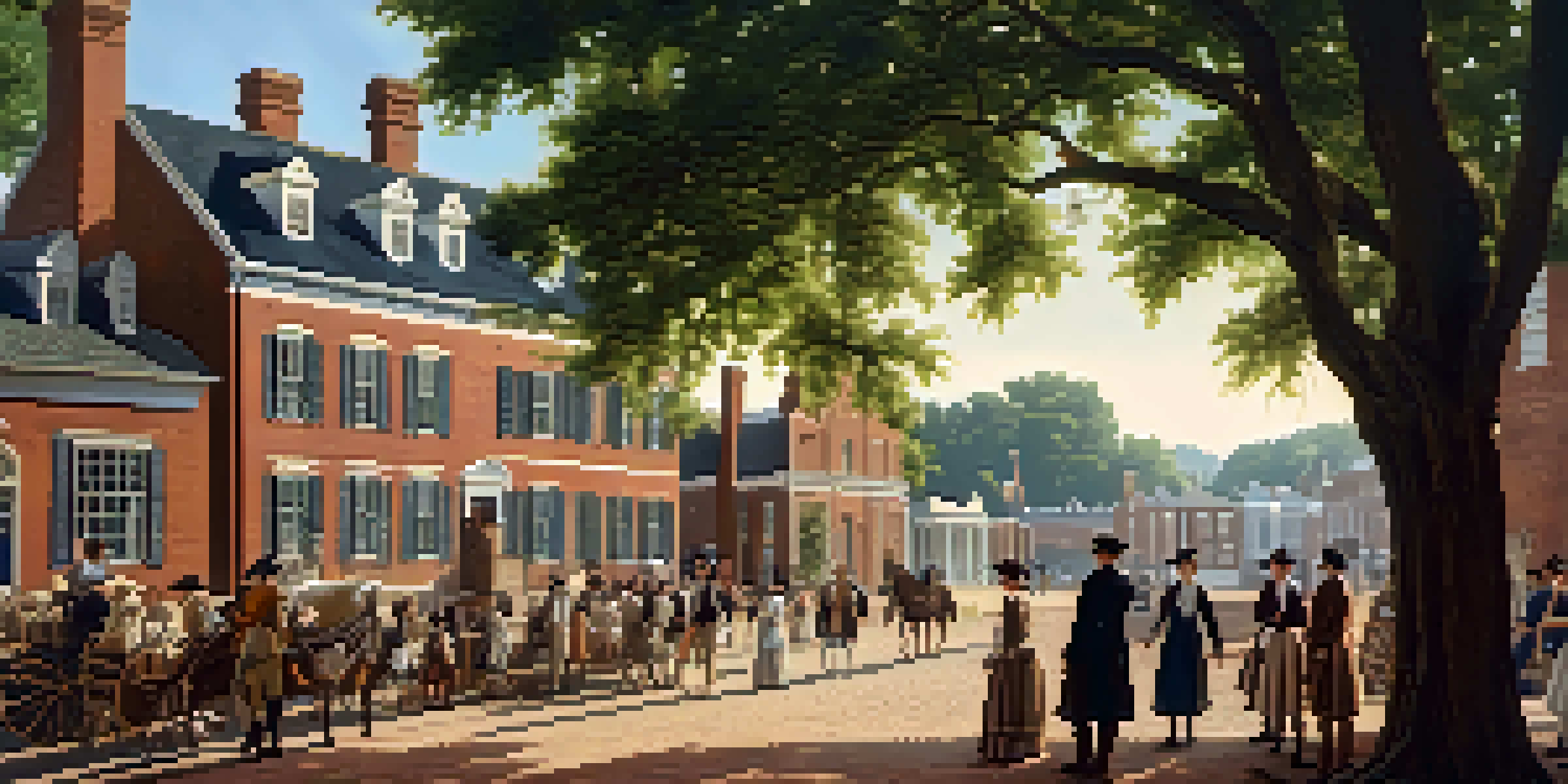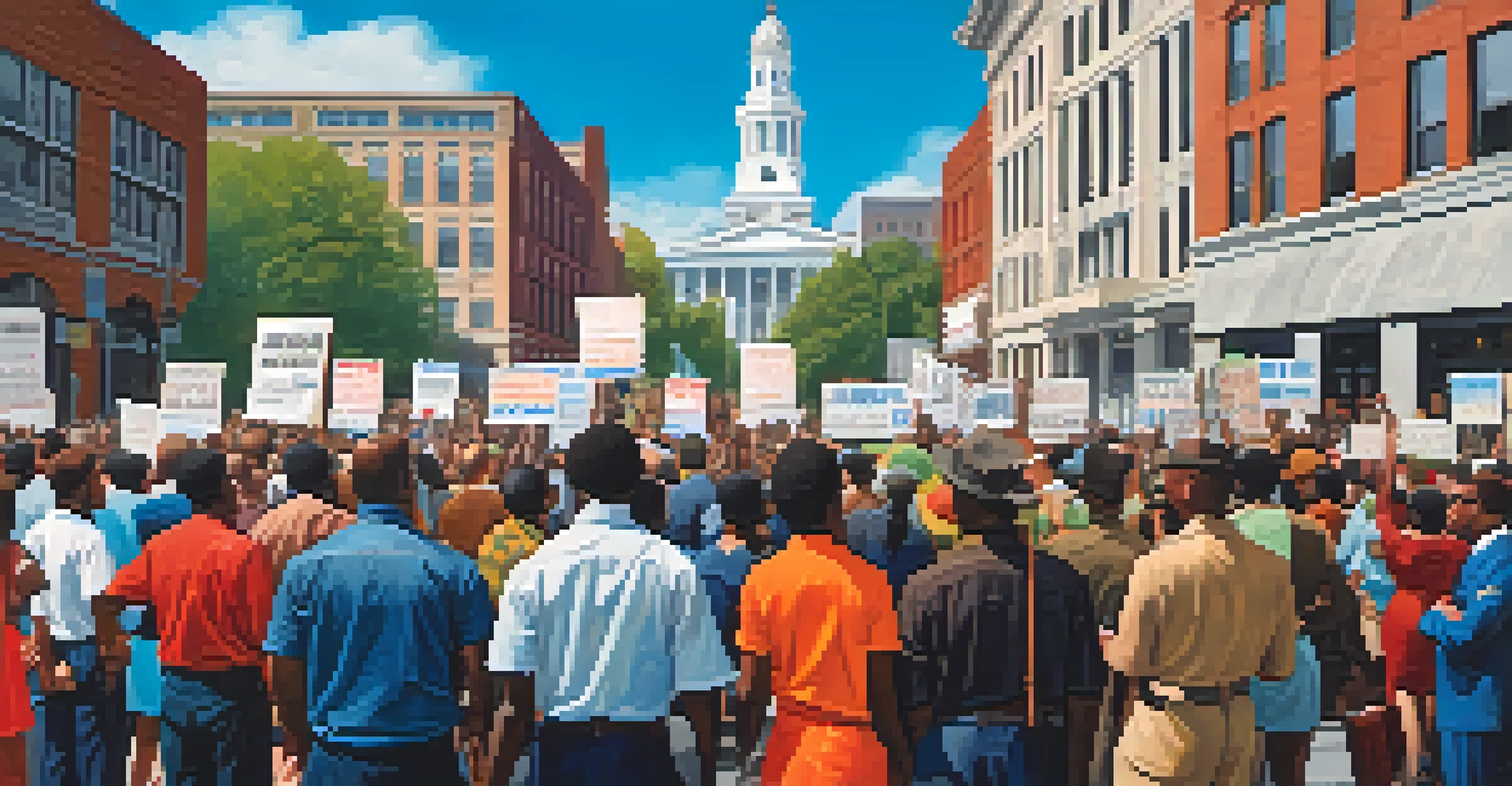Raleigh's Political History: A Timeline of Major Events

The Founding of Raleigh: A Capital Takes Shape
In 1792, Raleigh was established as the capital of North Carolina, chosen for its central location. This decision was pivotal, as it aimed to foster growth and accessibility in the region. The city was designed by architect William Christmas, who envisioned a layout that reflected the ideals of the time, promoting democracy and community.
Democracy is not a spectator sport. It’s a participation sport, and it takes everyone to make it work.
Raleigh's founding represented a shift from the coastal cities that had dominated the state's politics. The promise of a more centralized government helped to unify North Carolina's diverse regions. As settlers moved inland, Raleigh became a symbol of progress and the new direction for the state’s political landscape.
This decision to establish a new capital was not without its challenges. Many residents were initially skeptical about moving from established cities like New Bern. However, as the city developed, it began to attract a growing population and solidified its role in North Carolina's governance.
Civil War Era: Raleigh's Role in Conflict
During the Civil War, Raleigh found itself at the heart of significant military activity. The city was occupied by Union troops in 1865, marking a crucial moment in its history. This occupation led to a shift in political power dynamics, with many local leaders reassessing their allegiances and roles.

The war left lasting scars on the city and its inhabitants, affecting the economy and the social fabric. Despite the challenges, Raleigh began to rebuild, focusing on reconciliation and recovery. This period saw a rise in political activism as residents sought to redefine their identities in a post-war society.
Raleigh's Founding as a Capital
In 1792, Raleigh was established as North Carolina's capital to promote growth and accessibility.
Raleigh's experience during the Civil War was reflective of broader national tensions. The aftermath prompted discussions about civil rights and governance that would echo throughout the subsequent decades, shaping the city’s political identity.
Reconstruction: A Time of Change and Turmoil
The Reconstruction era brought both hope and strife to Raleigh as the nation grappled with the consequences of the Civil War. This period saw the introduction of new policies aimed at integrating formerly enslaved people into society. Raleigh, as the state capital, became a focal point for these changes, hosting heated debates and legislative sessions.
The only thing necessary for the triumph of evil is for good men to do nothing.
Despite the intent for progress, the Reconstruction efforts faced significant resistance from various factions. The rise of groups like the Ku Klux Klan created an environment of fear and violence, undermining the gains made by African Americans during this time. This conflict highlighted the deep-seated divisions within Raleigh and the state as a whole.
As the years progressed, Raleigh began to stabilize politically, but the scars of this tumultuous period remained. The struggles during Reconstruction laid the groundwork for future civil rights movements, as citizens continued to fight for equality and representation.
The Civil Rights Movement: Raleigh's Local Impact
The Civil Rights Movement of the 1960s sparked significant activism in Raleigh, reflecting the national struggle for racial equality. Local leaders, students, and citizens organized protests and sit-ins, demanding an end to segregation and discrimination. Raleigh became an important battleground for these vital social changes.
One of the key events was the sit-ins at lunch counters, which gained national attention and highlighted the fight against racial injustice. These actions were not just local; they were part of a larger movement that sought to dismantle systemic racism across the South. Raleigh’s involvement showcased the courage and determination of its residents.
Civil Rights Movement Engagement
During the 1960s, Raleigh became an important site for civil rights activism, reflecting the national struggle for racial equality.
As a result of these efforts, Raleigh saw gradual reforms in its policies and practices. The Civil Rights Movement not only transformed the city but also set the stage for ongoing discussions about race and equality in politics, reminding citizens of the importance of civic engagement.
Modern Politics: Raleigh's Evolving Landscape
In recent decades, Raleigh has experienced a transformation in its political landscape, reflecting broader trends in urbanization and demographic shifts. The city's population boom has led to increased political engagement, with more residents participating in local governance. This has created a dynamic environment where diverse voices are heard and represented.
Raleigh's growth has also spurred discussions on issues such as affordable housing, transportation, and environmental sustainability. These topics have become focal points for local leaders, who are tasked with balancing growth while preserving the city’s character. The interplay between development and community needs is a central theme in Raleigh’s modern politics.
As Raleigh continues to evolve, its political history serves as a reminder of the importance of civic involvement. The city’s residents are actively shaping its future, demonstrating that history is not just a record of the past but a guide for the present and future.
Key Political Figures: Influential Leaders of Raleigh
Raleigh has been home to numerous influential political figures who have shaped its history and governance. Leaders like Governor Charles Aycock, who served in the early 1900s, championed education and public infrastructure, leaving a lasting legacy. His efforts exemplified the role of local leadership in addressing the needs of the community.
In more recent years, mayors such as Nancy McFarlane have played crucial roles in advocating for progressive policies and inclusivity. Her tenure highlighted the significance of leadership in fostering dialogue around important social issues. These figures illustrate how individual actions can ripple through the political landscape.
Modern Political Transformation
Raleigh's recent demographic shifts have led to increased political engagement and discussions on key community issues.
The contributions of these leaders underscore the importance of civic engagement and responsibility. As Raleigh continues to grow, the influence of its political figures remains vital in navigating the challenges and opportunities that lie ahead.
Conclusion: Raleigh's Political Journey
Raleigh's political history is a testament to the resilience and adaptability of its residents. From its founding as a capital city to its role in pivotal historical moments, the journey has been anything but linear. Each era brought unique challenges and triumphs, shaping the city into what it is today.
As we reflect on this timeline, it’s clear that the political landscape of Raleigh continues to evolve, influenced by its rich past. The engagement of its citizens, past and present, plays a crucial role in driving change and fostering a vibrant community. Understanding this history is essential for anyone looking to grasp the complexities of Raleigh's political identity.

Looking ahead, Raleigh stands at a crossroads, with opportunities to learn from history while addressing contemporary issues. The city’s political story is ongoing, and its future will undoubtedly be shaped by the actions and voices of its residents today.